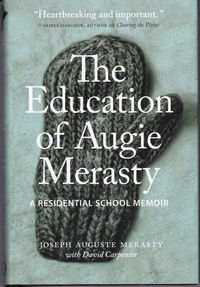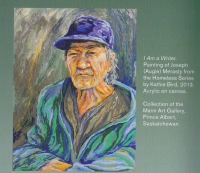The Education of Augie Merasty

Offers a courageous and intimate chronicle of life in a residential school.
A retired fisherman and trapper, Joseph A. (Augie) Merasty was one of an estimated 150,000 First Nations, Inuit, and Metis children who were taken from their families and sent to government-funded, church-run schools, where they were subjected to a policy of "aggressive assimiliation." As Merasty recounts, these schools did more than attempt to mould children in the ways of white society. They were taught to be ashamed of their native heritage and, as he experienced, often suffered physical and sexual abuse. Even as he looks back on this painful part of his childhood, Merasty's sense of humour and warm voice shines through.
Merasty attended St. Therese Residential School in the community of Sturgeon Landing, Manitoba, from 1935 to 1944.
 Augie died February 27, 2017 in Prince Albert SK.
Augie died February 27, 2017 in Prince Albert SK.
He was 88.
His legacy carries on.
Critical Response
"In reading The Education of Augie Merasty, I have seen horror through the eyes of a child"
- James Daschuk, author of Clearing the Plains
"It's so small, but it's such a mighty book."
- Anna Maria Tremonte, CBC Radio's The Current (April 23, 2015)
"The Education of Augie Merasty ... might be one of the most important titles to be published this spring.... It's a story of resilience and perserverance--the tale of a man not only haunted by his past, but haunted by the fundamental need to tell his own story."
- Mark Medley, The Globe & Mail (March 21, 2015)
"Well suited to a teenage audience because of its brevity and frankness."
- The Globe & Mail
"A sharp-eyed account." - Toronto Star
"At 86, Augie Merasty has been a lot of things: Father. Son. Outdoorsman. Homeless. But now he is a first-time author, and the voice of a generation of residential-school survivors.... The Education of Augie Merasty is the tale of a man not only haunted by his past, but haunted by the fundamental need to tell his own story... one of the most important titles to be published this spring."
- The Globe & Mail
"The Education of Augie Merasty might be a small book, but it carries a punch to it that all Canadian need to read and understand."
- Rabble
"Historically significant." - Publishers Weekly
"[Augie] wrote his memoir to show people the unbelievable atrocities suffered by so many Indigenous people and in the hope that others would come forward to tell their stories of what happened in the residential schools."
- Eagle Feather News
"This book is so much bigger than its small size. It is a path to healing. We cannot change history, but we can acknowledge it, learn about it, and remember it."
- Prairies North
"Carpenter's introduction and afterword... allow us to come to better understand Augie's 'sometimes chaotic, sometimes heroic aftermath of his life,' as Carpenter describes his last decade. Where Augie focuses on physical scars, Carpenter's experiences with Augie illustrate the long-term impacts on his residential school experience. And with The Education of Augie Merasty, he helps Merasty--who could be any number of individuals we each pass on the street--find his voice."
- Active History
"Unsettling and profound, and good."
- Blacklock's Reporter
"A truly extraordinary memoir by a truly extraordinary man."
- Midwest Book Review
Media Coverage
